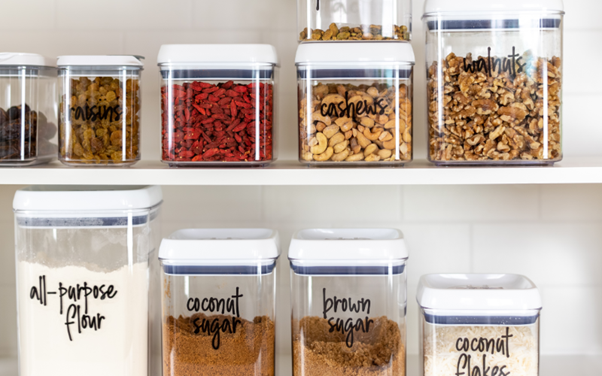Bakeries, restaurants, and home bakers purchasing bread flour and bakery mixes in large quantities must know how to store these ingredients properly to preserve their quality. As the cornerstone of numerous baked products, improper handling can result in considerable financial setbacks.
Discover how to effectively store bulk bread flour and bakery mixes to guarantee their durability and quality.
7 Tips on How to Store Bulk Baking Supplies
1. Understand the Nature of Flour and Bakery Mixes
Understanding the nature of bread flour and bakery mixes is necessary before discovering storage techniques. Flour, especially in large quantities, is susceptible to moisture, pests, and oxidation. Bakery mixes, which often include a blend of flour, sugar, leavening agents, and other dry ingredients, have similar vulnerabilities. Both products can lose their potency, absorb off-flavours, or become contaminated if not stored correctly. Understanding these risks will help select the appropriate storage method.
2. Choose the Right Storage Containers
One of the most critical decisions when storing bulk bread flour and bakery mixes is selecting the appropriate containers. Food-grade plastic or metal bins with airtight seals are ideal for this purpose. These containers should be large enough to accommodate the bulk quantities while also being easy to handle. Airtight seals prevent moisture and air from getting inside, which helps maintain the freshness of the flour and mixes. Additionally, these containers should be stored off the ground to avoid contamination from pests and to allow air circulation underneath.
3. Temperature and Humidity Control
Maintaining an appropriate temperature and humidity level is critical when storing wholesale baking supplies. Keep flour in a cool, dry place with a stable temperature. The ideal storage temperature is below 60°F (15°C), and humidity should be below 60%. Excessive heat can cause the flour to spoil faster, while high humidity can lead to clumping and mould growth. Due to their additional ingredients, bakery mixes are more sensitive to moisture and temperature fluctuations. Store these products in a climate-controlled environment to extend their shelf life.
4. Rotation and Inventory Management
Proper rotation and inventory management are necessary to maintain your bulk bread flour’s and bakery mixes’ freshness. The first-in, first-out (FIFO) method is the most effective strategy. This strategy involves using older stock before newer stock to prevent ingredients from sitting too long and losing quality. Label containers with the purchase date and use-by date, and keep a log of when each batch was opened. Regularly inspect your stock for signs of spoilage or pest infestation, and discard any product that shows these signs. Effective inventory management also helps in planning future purchases and avoiding overstocking.
ALSO READ: Beginner’s Guide to Different Types of Flour & Which to Use
5. Pest Prevention
Pests like rodents, insects, and mites can be an adverse problem when storing bulk flour and bakery mixes. These pests are attracted to the starchy and sugary nature of these ingredients. Store your containers in a clean, dry area away from walls and off the ground to prevent infestations. Inspect the storage area regularly for any signs of pests and take immediate action if any are found. Using airtight containers will significantly reduce the risk of pests, but additional measures like using pest traps or professional pest control services can provide extra protection.
6. Buying from Reputable Wholesale Baking Suppliers
The quality of your bulk bread flour and bakery mixes starts with the supplier. Purchasing these ingredients from reputable wholesale baking suppliers who guarantee freshness and quality is critical. Look for suppliers with a solid track record and positive customer reviews. Buying from trusted suppliers also ensures that the flour and mixes are correctly handled before they reach you, reducing the risk of contamination or spoilage.
7. Long-Term Storage Solutions
Freezing is an excellent option for those who need to store bread flour and bakery mixes for an extended period. Flour can be stored in the freezer for up to two years without losing quality, as the cold temperature inhibits the growth of bacteria and mould. However, using freezer-safe, airtight containers is necessary to prevent freezer burn. When you’re ready to use the flour or mix, allow it to return to room temperature before opening the container to avoid condensation.
Conclusion
Buying bread flour in bulk or acquiring wholesale bakery mixes is not the be-all and end-all of baking inventory. Proper storage of bulk bread flour and bakery mixes is still necessary as it helps preserve the quality and freshness of these vital ingredients. You can guarantee that your ingredients stay in optimal condition for all your baking endeavours by comprehending the characteristics of these products, selecting appropriate storage containers, regulating temperature and humidity, implementing effective inventory management, safeguarding against pests, and sourcing from reputable wholesale baking suppliers.
Contact Prima Flour and let us help you take your baking to the next level.






